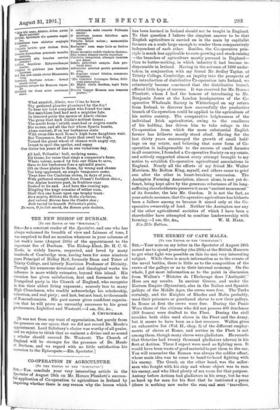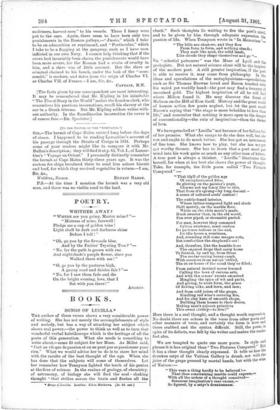THE HERMIT OF CAPE MALEA.
[To THE EDITOR OF THE "SPEOTATOR:1
Sin,—Your note on my letter in the Spectator of August 24th caused me to spend yesterday (the 26th) at the British Museum to get what light was possible on this (to me) very interesting subject. While there is much information as to the events of the naval battles, there is little as to the composition of the crews of the galleys or as to their internal economy. On the whole, I got most information as to the point in discussion from Wallon's " Histoire de l'Esclavage dans l'Antiquite." Here are my results. In ancient Greece, and under the Eastern Empire (Byzantine), also in the Italian and Spanish galleys of the Middle Ages, the crews were free. The Turks certainly, and the Knights of Rhodes and Malta probably, used their prisoners or purchased slaves to row their galleys. In Rome at first the crews were free. During the Punic Wars those of the citizens who did not possess 400 drachmas (368 francs) were drafted to the Fleet. During the civil troubles both sides used slaves in the Fleet and the Army, but it seems to have been as a last resource. Wallon gives an exhaustive list (Vol. II., chap. 3) of the different employ- ments of slaves at Rome, and service in the Fleet is not among them, though many slaves were gladiators. He records that Octsvius had twenty thousand gladiators (slaves) in his fleet at Actium. These I expect were used as fighting men. It would have been waste of good material to put them to the oar, You will remember the Roman was always the soldier afloat, whose main idea was to come to band-to-hand fighting with his enemy. The Greek, on the other hand, was the sailor. man who fought with his ship and whose object was to ram his enemy, and who liked plenty of sea room for that purpose, Antony before Actium had gladiators in his army, but he was so hard up for men for his fleet that lie instituted a press (there is nothing new under the sun) and sent "travellers, muleteers, harvest-men" to his vessels. These I fancy were put to the oars. Again, there seem to have been only two punishments in the Roman galleys,—" Jussio," which I take to be an admonition or reprimand, and "Portisculus," which I take to be a flogging at the gangway, such as I have seen inflicted in our own Navy. I cannot help thinking that if the crews had invariably been slaves, the punishments would have been more severe, for the Roman had a strain of cruelty in him, and a slave was of little account. But the slave or criminal chained to his bench, under the lash of the " sous- comit.e," is modern, and dates from the reign of Charles VI. or Charles VII. of France.—I am, Sir, &c., CAPTAIN, R.N.
[The facts given by our correspondent are most interesting. It may be remembered that Mr. Kipling in his inimitable " The Finest Story in the World" makes the London clerk, who remembers his previous incarnations, recall his slavery at the oar in a Greek trireme. But Mr. Kipling seldom writes with- out authority. In the Scandinavian incarnation the rower is of course free.—ED. Spectator.]



































 Previous page
Previous page